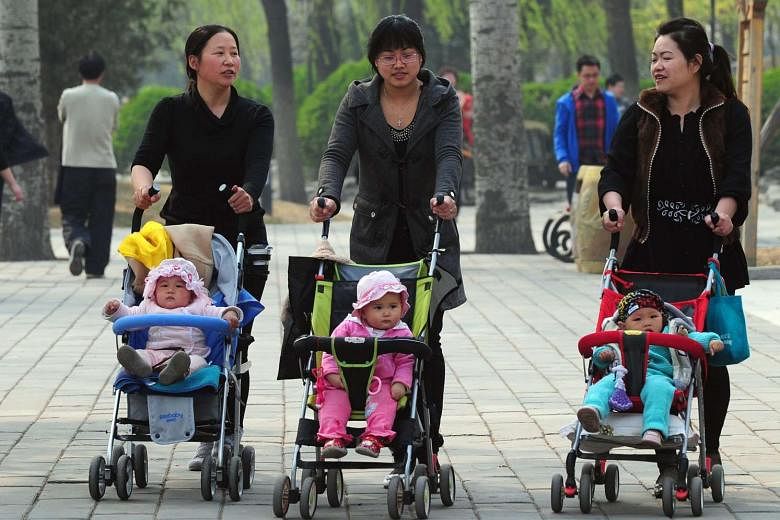The relaxation of China's decades-old one-child policy will lead to a baby boom that will shift the emphasis of its economy, said ANZ Bank's chief economist for Asia-Pacific, Mr Glenn Maguire.
The focus will move "from mining to dining", or a shift from an investment-led growth to a consumer-centric model as the rise in population raises demand for consumer goods across sectors, he said at the second Straits Times Global Outlook Forum at Shangri-La Hotel last Friday.
Tracing China's economic journey since the global financial crisis in 2008, Mr Maguire said the world's second-largest economy has been the major support to growth, not just in Asia but also in the global economy.
Two months after United States investment bank Lehman Brothers collapsed on Sept 15, 2008, China rolled out a 4 trillion yuan (S$824billion) stimulus package to combat the recession.
"Unfortunately, that support has not come without cost," said Mr Maguire. In 2008, China's total debt or credit levels were equivalent to 130 per cent of its gross domestic product (GDP).
Today, they stand at 210 per cent of GDP.
The increase of 80 percentage points is equivalent to the entire size of the US banking and finance system prior to the crisis, which was how China avoided a financial crisis - by investing in its own economy - he said.
"But that model is now strained," he argued. "China is now conducting an audit to find out how much debt has been lent for what projects, is that going to generate any sort of return?"
As a result, the "old" model of Chinese growth - where the government eases monetary conditions and pumps liquidity into the system, encouraging companies to borrow more to build new factories and expand production - no longer applies, "because China can't risk overextending its financial sector any more".
In its place, Beijing is now tightening monetary and credit conditions, which is likely to result in lower corporate investment and slower growth in production.
China's factory output last month dipped for the first time since July, signalling a slowdown in the economy's growth momentum. Slower expansion of production has in turn led to lower demand for commodities like steel from mining economies such as Australia and Brazil.
In its search for a more sustainable growth model, the government's solution is to turn to social policy to move the focus of the economy from investment-based growth to one that is focused on consumerism, he observed.
China has the lowest consumption-to-GDP ratio in the region. Figures in May showed consumption at 35 per cent of GDP, compared to India, where it makes up 60 per cent of GDP, and the US, where it is 70 per cent of GDP.
Referring to the third full gathering of the ruling Chinese Communist Party's (CCP) current Central Committee last month, Mr Maguire said: "One of the key outcomes from the Third Plenum was an elevated role for the market. But more importantly, a key dynamic would be a relaxation of the one-child policy."
On Nov 15, the CCP said couples will soon be allowed to have two children, as long as either spouse is an only child.
Currently, a couple can have a second child only if both of them do not have siblings.
He said the move could potentially add between five million and 10 million babies to the economy every year.
After five years, China could have between 25 million and 50 million babies.
"It's going to fundamentally skew the demographic profile back to being more favourable" to the economy, he said.
What follows a baby boom, he added, is the consumption of products from dairy to consumer staples like cotton for nappies.
Mr Maguire termed the shift as moving "from mining to dining", and said he expected the trend to pick up as early as next year.

